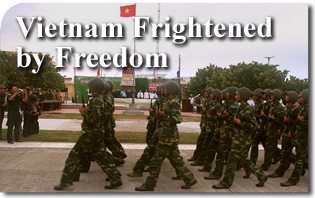 China has been taking substantial flak for severely restricting the lip service they pay to freedom of speech after having issued the infamous Document No. 9, which severely limited free speech. It has now started what appears to be a trend among communist countries. Vietnam, another behemoth with clay feet, is frightened that its population might have something to say contrary to the communist “paradise” in which they live.
China has been taking substantial flak for severely restricting the lip service they pay to freedom of speech after having issued the infamous Document No. 9, which severely limited free speech. It has now started what appears to be a trend among communist countries. Vietnam, another behemoth with clay feet, is frightened that its population might have something to say contrary to the communist “paradise” in which they live.
Freedom of speech in Vietnam is so free that its 30 million internet users now risk severe punishment or death if they share opinions or news articles contrary to the party line on their Twitter or Facebook accounts. Consistent with China’s “free speech” laws, Hanoi is cracking down on anything that can be construed as opposition the Socialist Republic or might do “harm to national security.”
Communists claim to be “great proponents” of the people and workers. They clamor for free speech in non-communist countries, until they usurp power, and then the rules change. Ironically, Hanoi issued a new law known as Decree 72 a mere month after Vietnamese president Truong Tan Sang was hosted at the White House and shortly before Vietnam applied to be accepted on the U.N. Human Rights Council.
Vietnam’s information minister Le Nam Thang has stated that Decree 72 was intended to prevent citizens from “misusing” the internet by spreading “false information.” From a warped communist perspective, truth is anything that furthers the goals of the party line and anything contrary to it is false. Personal web pages are only allowed to share personal information, no personal opinions, information from news agencies or other websites; only communist propaganda.
On top of oppressing its people further, Decree 72 will only help to stifle the development of Vietnam’s economy as it continues to show itself an intolerant totalitarian regime. Hanoi further claims that Decree 72 was also intended to protect intellectual property rights, not censor the internet.
However, Western observers have found the country has a long history of abusing, not protecting, intellectual rights. “The court system is inefficient, and the protection of intellectual property has been a major area of contention in international trade negotiations. A lack of democratic governance and accountability continues to perpetuate systemic corruption.”1
The whole world sees that Decree 72 has nothing to do with property rights and everything to do with controlling the population and supporting a corrupt government. The record is very clear.
Vietnam is considered an enemy of the internet by Reporters Without Borders because they have imprisoned more journalists than any other nation except China and Iran.
It remains baffling that the West continues to do business as normal with Vietnam. Western leaders take no measures to stop such coercive measures against the Vietnamese population. Meanwhile, Vietnam, frightened by freedom of the press, continues with its oppressive policies like Decree 72, confident that the West will do nothing.

